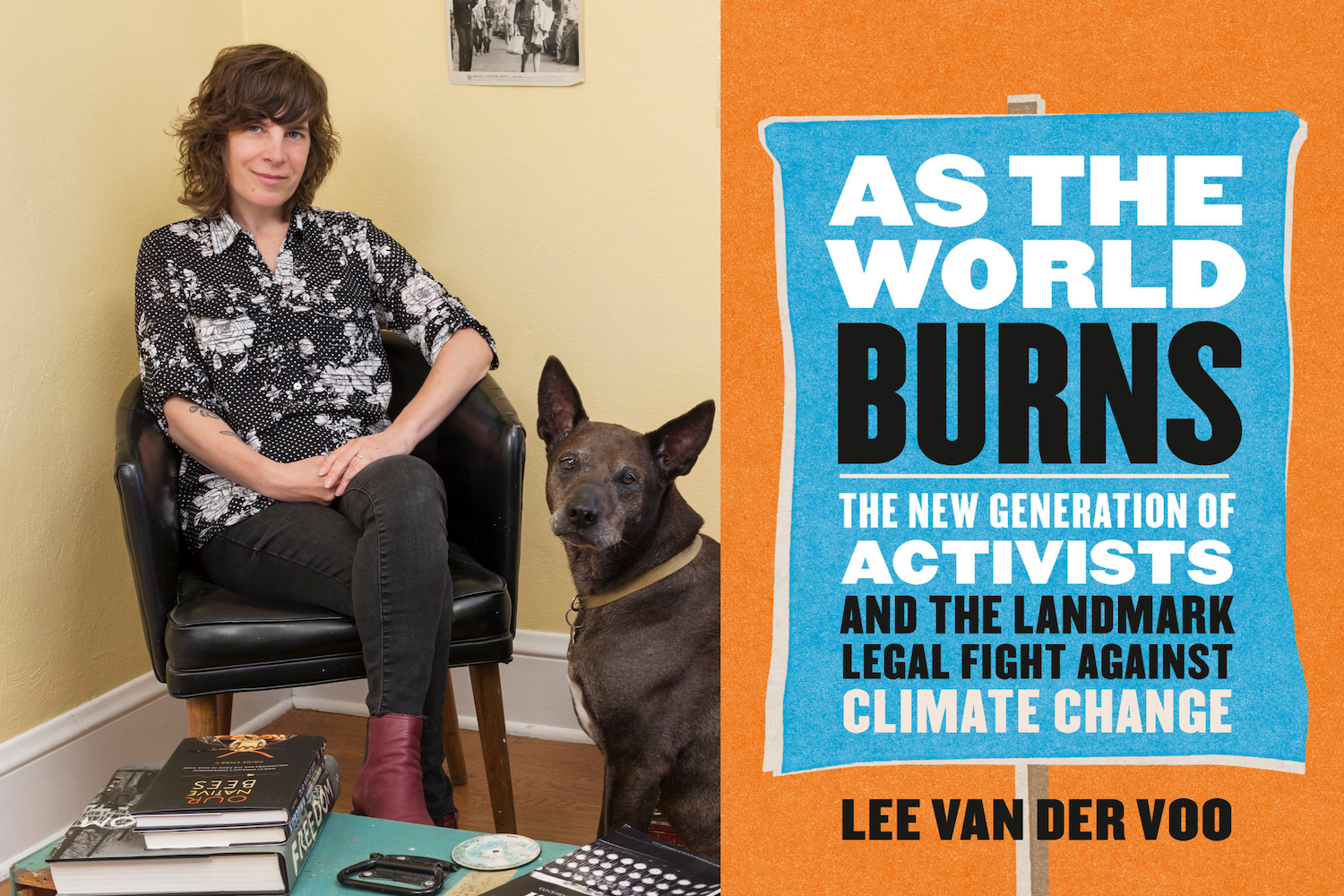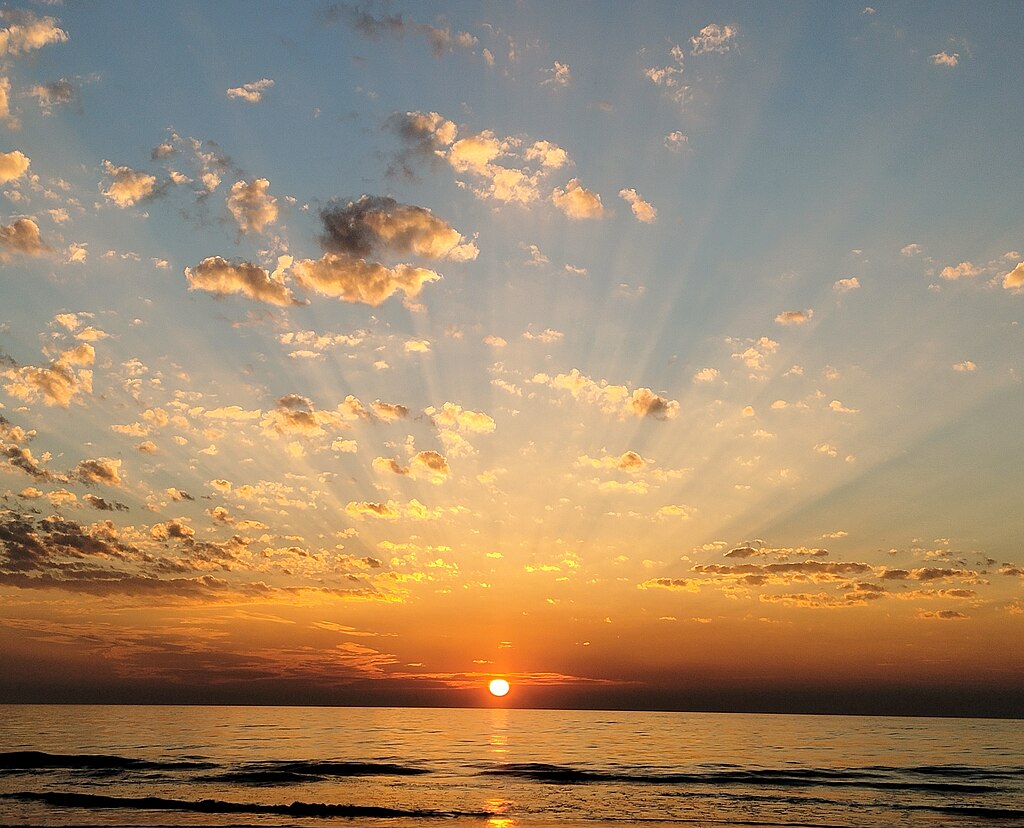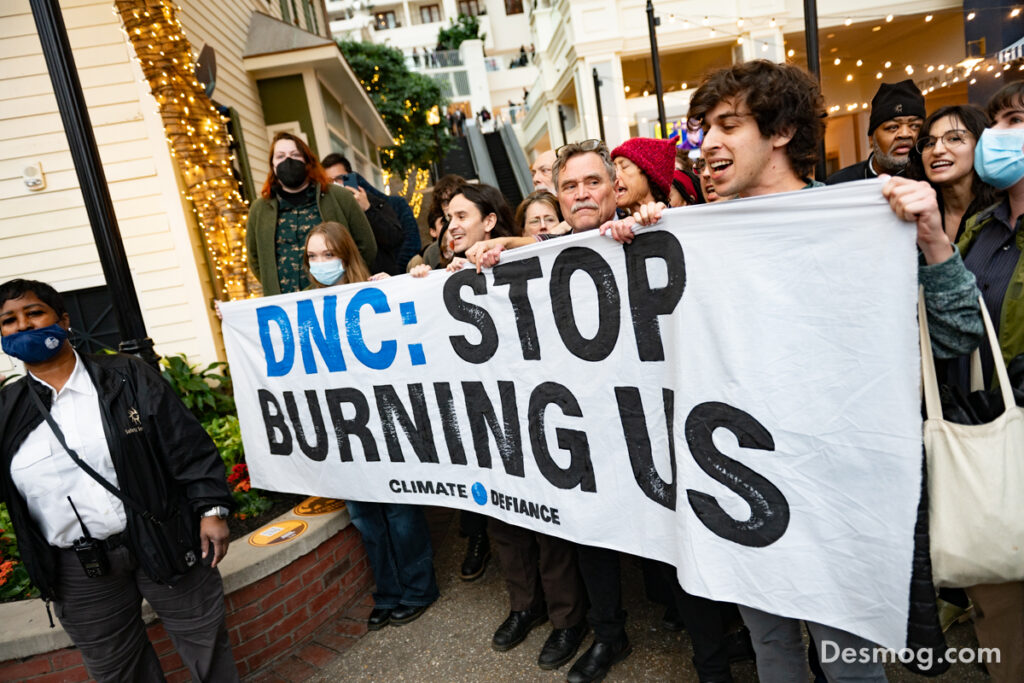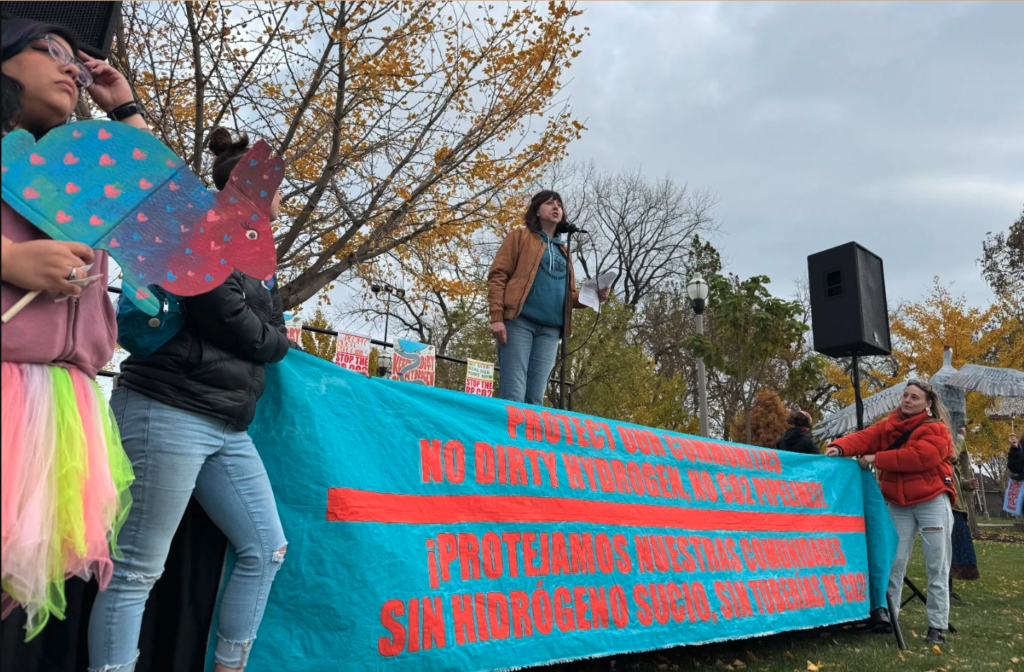Earlier this year a pair of judges on the Ninth Circuit Court of Appeals decided to dismiss the groundbreaking American youth climate change lawsuit Juliana v. United States. But the case is not yet over — while the 21 young people who sued the U.S. government await a decision on whether the full appeals court will review the ruling to toss the lawsuit, a brand-new book by award-winning environmental journalist Lee van der Voo takes a behind-the-scenes look at this landmark legal case and the youth plaintiffs known collectively as the Juliana 21.
The book, AS THE WORLD BURNS: The New Generation of Activists and the Legal Fight Against Climate Change, tells the stories of these young people who are part of a generation of youth fighting for their lives and their rights amidst the unfolding climate crisis. “AS THE WORLD BURNS is climate breakdown like you’ve never seen it — through the eyes of the young,” the book’s description notes.
DeSmog reporter Dana Drugmand recently chatted with author Lee van der Voo about this new book on the Juliana youth climate lawsuit. The interview, which has been edited slightly for brevity, explores why the book is so timely, how the Juliana lawsuit is part of a broader youth movement, and how the mainstream media “is in danger of being on the wrong side of history” when it comes to covering the climate crisis.
DeSmog: The title — As the World Burns — seems strikingly timely and relevant. We’ve seen horrific fires, almost something out of sci-fi film, around the world, like in Australia and of course here at home in the U.S. You’re from Oregon, one of the places torched by fires and smothered by smoke, as are some of the youth plaintiffs that we get to meet through this book. What have the last few weeks been like, and do you think the fires give these young people even more moral urgency to press their demands for climate action?
Lee: I think that they do, and I wish that weren’t true. But I think climate change is one of those things where unless it’s in your backyard, then it’s an abstraction. Already it’s moved from ‘save the polar bears,’ a very distant idea just a decade and half ago to saving people’s homes and saving communities. So, I think it does make the youth cause all that more urgent now to have such enormous calamity happening all over the world. But at the same time it’s really terrible we’re seeing so much disaster.
The last few weeks have been kind of awful, but much more awful for people who are not me. I mean, 2020 has been a really difficult year. Portland [Oregon] has had more than 100 days of protests … We’re already dealing with coronavirus and were one of the first communities to shut down, because we’re so close to where some of the first cases were found in Seattle in early March … When you add wildfire to that, it’s truly difficult.
Two of the Juliana plaintiffs are from southern Oregon, Alex Loznak and Jacob Lebel. And both of them joined the lawsuits specifically, in addition to other reasons, out of concern of increasing wildfires. They both live in rural areas and come from family farms. Wildfire for them comes with tremendous risk, you know, they could lose everything. I saw a photo of Alex that his dad took and it was just him in a respirator with his friend against a red sky. It was just horrifying.
DeSmog: Why write this book, and why should folks — beyond progressive types and climate activists — read it? Like, quite a few tell-all books have come out recently about President Trump and the kind of insanity surrounding him, but couldn’t it be argued that the insanity of our government standing by as the world burns trumps even this political firestorm of the Trump administration?
Lee: Yeah, I think so. I think what is happening with the breakdown of the planet is far more urgent. So, I wrote the book because I was planning on [covering the trial in this case], and I was surprised when the trial was canceled. It seemed to me that a group of young people bringing this issue into a courtroom was one of the best opportunities our nation was going to have to cut through the partisan dialogue around climate change. These were 21 young people who filed their litigation under the Obama administration. The fact that it was going to trial under Trump just really took any charge that it was politically motivated out of the equation. They went through two presidential administrations with the same legal questions.
Given the spectacle of 21 young people suing their government over such a consequential issue, I just felt like it was finally going to give the nation a chance to have a conversation that it needed to have. The science was going to come out in court, there was going to be less grandstanding about it. And it would be an opportunity for young people to tell their stories about what that’s really like for them. To see that not happen, it was like OK, were we ever going to get that opportunity as a nation? It made me really worried for America and the world.
At the same time, having had the experience of getting to talk to these young people about what climate change means for them was so eye-opening for me as Gen Xer, that I felt compelled to continue the reporting.
AS THE WORLD BURNS is timely, must-read reporting on #ClimateChange, the government, and a new generation of activists. Join @lvdvoo on 10/1 for her launch event at @grbooks in conversation with Kiran Oommen. Register and buy the book at the link below. https://t.co/eZZFtvTOM0 pic.twitter.com/WrScWVtbtF
— Timber Press (@timberpress) September 28, 2020
DeSmog: The book gives us personal insight into the Juliana 21 youth plaintiffs, as you take us into their homes and give us a glimpse of who they are and why they are in this fight. Why is it important to highlight their stories? Would you say young people like these youths are the moral leaders in the struggle to address the climate emergency?
Lee: I do think that young people have the moral authority on this issue. They’re the affected generation, they’re the ones who are going to have to grow older and live with the consequences of the actions that we’re taking or not taking right now. So yes, I think their voice really should be elevated.
What I think is so interesting about the Juliana plaintiffs is they were already really educated climate activists when they came into the fight, and they got increasingly educated through this fight. They were three years into this at the point where I was even meeting them, and I think they understand in a very deep way, probably better than many older folks, the entrenchment of fossil fuel interests in their government, and what really drives the broader non-response of our society. So for me, their stories were a really extraordinary lens into what paralyzes our nation in the face of this existential threat.
DeSmog: “Let the youth be heard” has been the rallying cry in urging courts to allow the case to go to trial. The book describes all the planning and excitement leading up to the [second scheduled] trial on October 29, 2018, which got delayed and eventually canceled. You were there in Oregon with the plaintiffs at the time. What was that like emotionally?
Lee: At first it was very confusing … essentially we had three courts litigating the same issue at the same time. So it was really tough to track and it was a few days of just confusion.
And then there was a feeling of frustration that this hadn’t happened. It really seemed to me like a missed opportunity for the nation.
Rally outside the Ninth Circuit Court of Appeals in San Francisco, California on October 29, 2018, one of many rallies held that day of the scheduled trial across the U.S. in support of the Juliana youth plaintiffs. Credit: Peg Hunter, CC BY–NC 2.0
DeSmog: Litigation can sometimes take years to play out. We don’t have that kind of time with the climate emergency. So, I wonder if you could speak to the impact these court cases could have beyond the actual court rulings, and I think Juliana is a great example of this — it is about furthering the conversation and igniting cultural change, which then can help push leaders to act. Had there been a trial in Juliana, for example, I think that would have been like a victory in itself, would you agree?
Lee: Yeah, I agree with both those things. I think it’s about raising the voice of the young and galvanizing other young people into action. And also capturing media attention on an issue that is often just outside the frame of what reporters are dealing with day-to-day in the news.
DeSmog: Talk a little more about the rise of the youth climate movement that we’re seeing in the U.S. and around the world with groups like Sunrise Movement, Greta Thunberg’s Fridays for Future school strikes, etc., and an increasing number of youth climate lawsuits. It seems like young climate activists are pushing all levers — engaging in politics, taking to the streets, and turning to the courts. What do you think of the rise of youth activism and how the Juliana case fits within that, since the lawsuit was filed [in 2015] before a lot of the youth climate movement took off?
Lee: I think the rise of youth climate activism is a great thing. I think it was galvanized in part by some of the horrible things that happened in 2018, the scale of natural disasters we witnessed with the loss of Paradise, California, with the burning of the Amazon, the polar vortex, and storms, it just woke people.
What I saw and what you see in the book is the transformation of at least some of the plaintiffs as they move from the courthouse steps into this broader movement. I think there’s a recognition that one lever is not going to make it all right, the cause is happening in all different venues. It remains to be seen which of them will be effective, if any. But there’s an increasing sense of urgency with young people in the movement and with it, an increased desire to try anything.
Lee van der Voo, environmental journalist and author of AS THE WORLD BURNS. Photo courtesy of Lee van der Voo.
DeSmog: At one point in the book, chapter 10, I believe, you talk a little about the media’s responsibility for basically missing the climate story and for legitimizing disinformation and the climate “debate” [and you give a shout out to DeSmog’s Climate Disinformation Database, yay!]. Talk a little about the mainstream media’s treatment of climate and what you think it might take for it to change.
Lee: Well, I don’t want to discount the extraordinary work of a limited number of folks who have pushed very hard for this to be covered and covered correctly in mainstream media for a long time. Obviously, there are some great journalists that came long before me on this issue and worked really hard. But they’ve talked pretty openly with me about the challenges, and one of the challenges they’ve had is this pressure to get comment from both sides of an issue. We know, well, this was more true in days past than it is currently, but a lot of folks who are in leadership positions in journalism come to it from a political reporting background, and they do see issues as having two sides. Most debates in policy have at least two sides. So, their job is to represent the full range of the discussion … What reporters told me is that in days past they were subject to extraordinary pressure, both inside the newsroom and from external forces that charged them with being un-objective or biased … because they hadn’t properly aired some wacky theory about how we were all going to be living in some utopian biodome in an era when CO2 was running rampant. So, I think this, in the early days, paralyzed some reporters’ ability to deal effectively with climate change.
Now we’re in this era when everything is just happening right now, and every day it’s this shiny red ball with news where we’re just supposed to be running after the most relevant, timely thing. And if it doesn’t have a time peg, or if it isn’t going to change election outcomes given how distracted we are with partisan politics right now, it gets pushed to the fringe. And I think in this industry we are very badly in danger of being on the wrong side of history on this issue. Climate change is urgent, it’s happening right now, and there needs to be more mainstream news coverage of its effects. I think that is happening slowly, and some news institutions have really led the way. But there’s still more to do.
We need to understand in our own training that we would never show up to a car crash and start asking people if it really happened, or if they witnessed it and if they believe it. We would never ever do that, and we shouldn’t be doing that with science.
DeSmog: In November 2018, things are already pretty bad in Trump’s America, as you describe in chapter 9. This statement you make stood out to me: “It is hard for some to see that Earth is breaking down when our nation is breaking down so grandly, so radically, day by day in newscasts.” Well, 2020 has been a dumpster-fire year in a lot of ways and as we near November 2020, that statement seems more relevant than ever. Obviously, climate is on the ballot in November, but it can be easy to overlook that when some say our democracy itself is at stake. What are your thoughts on that?
Lee: Yeah, I totally agree with you. 2020 is like a dumpster-fire year. People come into elections with their whole set of values, and not many folks vote on just one issue, though some do, but I don’t know that climate change is it. I think it’s so easy in these partisan times … to be reflexively reacting to news and information. It’s almost like sports fanship in this weird way, where you’re getting out there and cheering your team regardless of what’s happening.
Climate change is like a lot of really unsettling things in American culture right now. It is about all Americans fighting corporate influence on our government. At the end of the day, America’s unwillingness to change boils down to the extraordinary corporate influence of the fossil fuel industry on our government. I mean, that’s it. I feel like if we could take this reflexive cheering and boosting of one’s team out of these conversations, we’d find that most Americans, regardless of what political stripe they want to wear, feel strongly that individual liberty and human health and safety are more important than corporate profit. That’s the conversation we need to have.
AS THE WORLD BURNS (published by Timber Press) is on sale starting September 29, 2020. More info at https://leevandervoo.com/books/as-the-world-burns
Main image: Author Lee van der Voo and the cover of her new book, AS THE WORLD BURNS.
Subscribe to our newsletter
Stay up to date with DeSmog news and alerts









